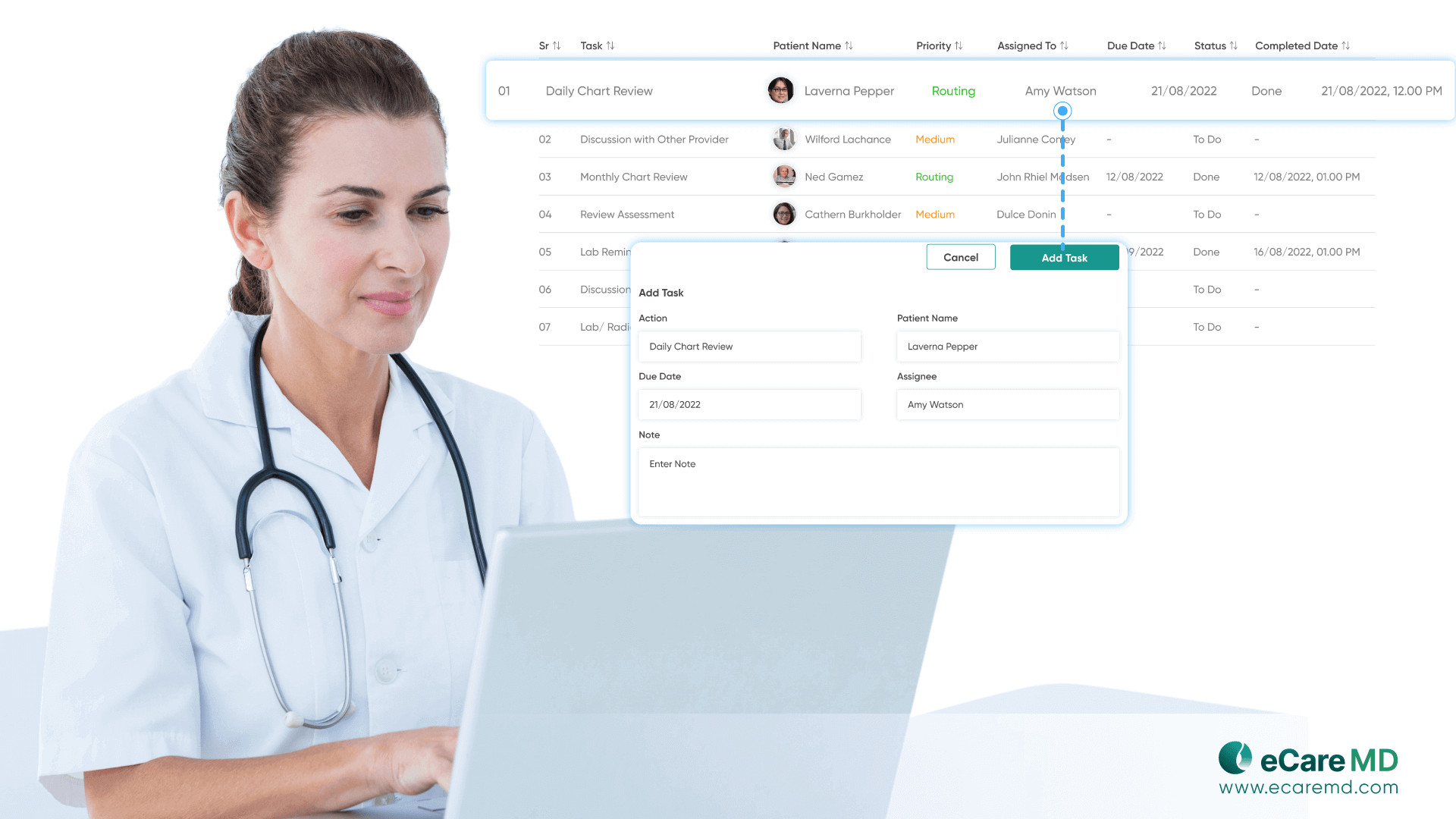Client Background
Based in Texas, the client is a prominent healthcare provider who operates a series of network hospitals and delivers care to patients with multiple chronic conditions. The client has fewer medical staff members who attend to patients through scheduled in-person visits.
Business challenges
Having managed patients for a while, the client understood that it was difficult to manage more patients with a lower medical staff, which also reduced the practice's efficiency.
Some of the challenges faced by the client are:
1. Challenges in managing a large patient population
Chronic care management requires performing various clinical activities over a prolonged period of time for optimum care. It was becoming difficult for clients to manage and deliver personalized care to a large patient population with fewer medical staff. It created delays in delivering care that affected the patient's health outcomes.
2. Inefficient task management
Smoother healthcare delivery is crucial in delivering value-based care and achieving expected patient health outcomes. Delays in care delivery caused by lack of communication and absence of task assignment functionalities affected proactive efficiency, patient outcomes, and patient satisfaction rates.
3. Challenges in delivering personalized care
Patients with multiple chronic conditions require more attention and personalized care. With fewer medical staff, care providers were not able to deliver personalized, preventive care to patients and address their specific needs. This increased hospital readmissions and emergency visits.
4. Patient engagement and treatment adherence
Keeping the patient engaged and adhering to the prescribed treatment plan is a crucial aspect of managing the patient’s chronic conditions. Lack of communication facilities made it difficult for care providers to keep patients engaged and adhere to treatment plans.
Solution
The client has approached Medarch Inc. for eCareMD software to facilitate care coordination and streamline the practice workflow. Upon understanding the client’s requirements and business challenges, our team implemented the eCareMD software into the client’s practice.
Solution Highlights
The eCareMD platform consists of advanced technological features that streamline the practice workflow and increase efficiency.
Some of the key features that addressed the client’s challenges are:
1. Quick patient creation and enrollment
Manual patient creation and enrollment consume a lot of time, and attending to patients physically and creating notes hampers the care provider’s efficiency. Our eCareMD platform resolved this challenge as it allows care providers to create thousands of patients in a single click through a CSV file. Also, it allows the sending of consent forms for participation in the program to bulk patients to get them enrolled.
These features saved a lot of time, which helped care providers manage more patients and deliver care to them.
2. Automated task assignment and Notifications

Completing task assignments scheduled for various clinical activities can help a lot in obtaining the expected clinical outcomes of patients. Keeping this in mind, our eCareMD software’s task assignment and notification feature enabled care providers to assign various tasks to care team members. It also notifies the assigned care provider regarding the scheduled task for them. It facilitates the on-time completion of tasks and reduces the confusion and delays in performing the tasks. Using this feature, the practice's task completion rate has increased by 60%, resulting in improved patient health outcomes.
3. Patient-centered care plan assignment
Addressing the patient's health concerns and specific needs plays a vital role in managing the patient’s chronic condition. Based on the patient’s chronic conditions, the eCareMD software automatically suggests an accurate care plan, and the provider can assign multiple care plans to the patient in a single instance.
Also, the software enables care providers to provide monthly updates on care plan progress, review vitals, and assign assessments to evaluate patient health. These features improve patient health outcomes by 40%.
4. Enhanced communication channels: boosts engagement

A significant challenge for the client was keeping the patients engaged and enhancing their treatment adherence. eCareMD software’s secure voice/video call, messaging, and notifications feature helped care providers and patients communicate in real time to discuss health concerns and suggestions. Also, to empower patients, the software allowed care providers to send educational material about the benefits of adhering to treatment plans.
Value Delivered
1. Increased practice efficiency
Features like virtual consultations, easy patient onboarding, and enrollment improved practice efficiency, as the time spent creating patients manually and in physical consultation, was significantly reduced.
2. Improved personalized care delivery
The automated task assignment feature enabled care providers to complete tasks on time and deliver personalized care to patients, which improved the quality of care.
3. Improved patient health outcomes and satisfaction rates
Features like personalized care plan assignments, monthly care plan reviews, and health evaluation through assessment assignments have improved patient health outcomes and satisfaction rates.
4. 40% Increase in patient engagement
The eCareMD software’s secure communication features and functionality for sending educational material have improved patient engagement and treatment adherence.

